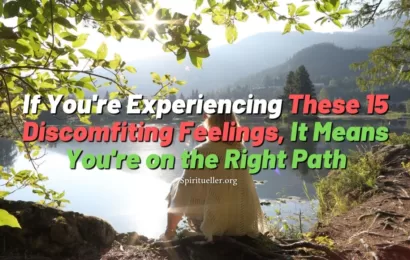
When you read the Law of Attraction, the focus will usually be on how you can use the law to your advantage and how to attract more into your life. The Law of Attraction concerns everything, both positive and negative, in the universe. As a result, this means you will be able to understand why all your heartaches, past traumas and difficulties have occurred. Also, by looking at your journey in this way, it will be easier to see how you can create a happier future for yourself. If you are always wondering “Why do bad things happen to me?”, this guide may help you to more closely understand the reasons for negativity in your life. Additionally, we will also discover how to progress as we reduce the impact of negative events from the past. From start to finish, we will focus on learning to better understand what has happened to us and looking forward to a productive future.
Are We Really Guilty When Bad Things Happen?
Thinking about why bad things happen can be painful. We often tend to blame ourselves or assume that our traumas show our worthlessness. However, the reality is more complex than what we think.
It’s important to remember that recent psychological studies have shown that negativity is contagious. Our thoughts and emotions influence, shape our ideas and beliefs. So, even if you have set good intentions and try to use the Law of Attraction to achieve them, contagious negativity from your environment can still arise.
Why Do Bad Things Happen?
There are five leading theories that can explain how the Law of Attraction is related to the bad things you have experienced so far. With this understanding, you can start thinking about how you can protect yourself from bad things in the future.
1. You Demonstrate This Through Fear or Negativity
It’s important not to ignore this reality, because you may accidentally attract negative things into your life out of fear or negativity. In other words, even if you set an intention but don’t confront the related limiting beliefs in your subconscious, you may send mixed signals. These not only hinder your ability to manifest what you want, but they may actually guide you towards things you don’t want in your life. Looking back, you might see that your toughest experiences were associated with unknown or suppressed fears that you had.
The way to overcome this common cause of negativity is to confront the conflicting emotions you have about your goals that you want to achieve. Instead of pretending they don’t exist, look at them head on and learn how to counter them with constructive and positive beliefs.
2. Someone Else Stated This
When thinking about the question “Why do bad things happen?” it’s also worth looking beyond yourself. Negativity is deeply contagious. As a result, you will often experience it when someone constantly talks about negativity, especially if they are someone you love or spend a lot of time with.
Think again about the specific negative things you are struggling with and consider who is around you. Could they be projecting the negativity you are experiencing?
In addition to thinking about negative individuals, negative environments can also be a significant factor. You can absorb negative energy in a workplace or even a building where many people are unhappy. This is a crucial reminder to be aware of who you allow into your life, how much time you spend with negative people, and what boundaries you set to protect yourself.
On the other hand, being with positive people can actively help you attract good things into your life.
3. Deviation
If you have doubted the validity of the Law of Attraction due to negative things happening or have used the concept to make yourself feel worse, you may be entering a deviation process.
In this context, deviation means avoiding growth, getting stuck and remaining ignorant about your biggest desires and needs. So, consider whether there may be certain feelings or facts related to yourself that you are trying to avoid; think about how this avoidance can be related to negative experiences.
However, it should be noted that it’s natural to want to deviate from or avoid certain things at times. Self-discovery can be frightening, especially when it conflicts with what we previously believed about ourselves or our life purpose. So, don’t beat yourself up for deviating, remind yourself of the cost of doing so. Instead, think about the benefits associated with growth.
4. The Universe Has Something Planned For You (Timing Is Everything)
When you experience heartbreak and trauma, you may feel like there’s no possible way that these experiences can lead to a better future.
However, sometimes you can’t achieve something positive right now because the universe needs you to achieve something even better later on. In other words, negative events can sometimes come as a necessary step on your path to your most important goal. No matter how painful some life events may be, they will often be part of the universe’s plan for your unique gifts.
Also, don’t forget that if you don’t achieve something (like love or abundance) at one point, it doesn’t mean you’ll never be able to do it. Timing is everything! And persistence can be the key.
So, be alert for signs and intuition that show you have reached the right moment to try again. When you look back, you may see that your struggles would have reduced your ultimate joy if they were not there.
5. Out of Our Control
Finally, think about major and terrifying events. Many practitioners of the Law of Attraction don’t like to say that such events are the cause of their victims’ own pain or that they have complete control over their lives. Instead, they can acknowledge that there are some things in life that we can’t control no matter how hard we try, despite not having complete control in principle. In the end, manifestation is a complex process. The balance of all our individual intentions can interact to produce unpredictable results.
There are two important things to take away from the message that we don’t have full control. First, there may be nothing you can do to prevent a traumatic event from happening. Second, instead, you will benefit from focusing on your internal reaction to that trauma, which is something you have complete control over.
What Now? How To Go Forward?
With a better understanding of how negativity can act like a contagion and the multiple roles the Law of Attraction can play in trauma, let’s continue to think about what you need to do. As discussed above, there are ways to reduce the chance of displaying negativity unintentionally. However, it makes more sense to focus your energy on actively embracing positivity.
You can find three powerful things you can do to move forward after a bad experience, along with examples that may relate to your situation, here.
1. Compete With Yourself
Challenging yourself is important for many reasons. Firstly, when we stay in our comfort zones, we tend to stagnate instead of progress. If you are going through a difficult time in your life, one of the best things you can do is to deliberately step out of that comfort zone. Make a list of things that will help you achieve your biggest goals. Then, take a look at which ones you have been avoiding. Focus on these and really engage with them. Tell yourself that you will learn, no matter what, without challenging yourself.
Secondly, challenge your way of thinking. When you realize that you have negative thoughts, examine the assumptions and roots of your beliefs. When and why did you learn this? Do you really endorse it? What positive things can you say to yourself to replace limiting, negative beliefs with stronger and more positive ones?
2. Forgive Yourself
When you ask, “Why do bad things always happen to me?” psychologists often point out that the likelihood of moving beyond negativity is higher if you truly believe that you deserve good things. If you get stuck in a mindset of blaming yourself for every challenge you face, you will only create more heartache and attract more negative people into your life. Instead, forgive yourself for past mistakes and adopt a non-judgmental attitude towards them. Of course, identify these types of mistakes and determine what you will do differently. However, separate this from assessments of your worth as a person.
If you struggle with forgiving yourself, consider whether you would show the same attitude to someone you love. If you are more kind and understanding to others while blaming and being hard on yourself, it means you are putting too much weight on yourself. We can all make mistakes and they are an important part of our growth.
3. Love Yourself
Lastly, in order to move forward after heartbreak and trauma, you will need to learn to love yourself deeply and genuinely. This partially involves forgiving yourself for your mistakes. However, it also involves truly celebrating your abilities and accomplishments. What do you like about yourself? What valuable contributions do you make to the world? How do the people you love describe you? All of these questions encourage you to focus on why you deserve love.
Loving and nurturing meditations can be helpful in developing self-love. These practices aim to assist in developing self-compassion by repeating affirmations. In a meditative state, you can design your own affirmations to repeat. A good example to start with is “I am happy, healthy, strong, and peaceful.” Daily loving, kind messages to yourself will help you slowly heal after trauma.









